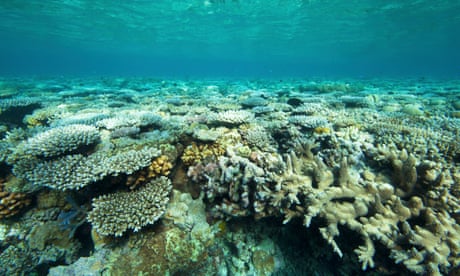- by foxnews
- 11 Jan 2025
?Reckless? plan to search for oil and gas will put one of world?s healthiest reefs at risk, conservationists say
‘Reckless’ plan to search for oil and gas will put one of world’s healthiest reefs at risk, conservationists say
- by theguardian
- 24 Dec 2021
- in news

Conservationists say a plan to search for oil and gas near Rowley Shoals in north-west Australia is "reckless" and will put one of the world's healthiest reefs at risk.
The area is an isolated archipelago of reefs home to three atolls - Imperieuse, Clerke, and Mermaid - that lie 260km off the coast of the Kimberley in Western Australia.
A scientific study published in April recognised Rowley Shoals' status as a thriving marine ecosystem that has escaped the harm seen in other reef systems around the globe.
The area is a biodiversity hotspot, with 96 different protected marine species living or migrating through the area, including 25 species of whales and dolphins, six types of sea turtle, 10 different shark and ray species, and 31 species of fish - including the Western Australian sculpin, a deep sea blobfish considered the ugliest animal in the world.
Eighteen of the 96 species are classified as threatened or endangered.
Spaced about 30km apart, Mermaid Reef is protected as a marine park under federal law, while the southern Clerke and Imperieuse reefs fall under the protection of the states.
But now a Perth-based company, Seismic Searcher, has applied to conduct seismic testing to search for oil and gas across a 8,584km sq area on the doorstep of these protected areas.
The proposed test will take place 4.4km from the boundary of the Mermaid Reef Marine Park and 11.9km from the Rowley Shoals Marine Park boundary.
Dr Cat Dorey, marine parks campaign manager for Australian Marine Conservation Society said the effect of any testing will "bleed over" into the marine park area.
"Sound waves don't acknowledge human borders in the sea," Dorey said. "You kind of have to wonder what is the point of a marine park where you can have oil and gas exploration going on with all of its risks?"
Seismic testing involves sending regular "sound pulses" under water in short blasts to create a 3D map of what lies beneath the surface.
The noise generated can reach 250 decibels as the sound waves generated by the blast penetrate the seabed. In comparison, the loudest whale noises range between 140 and 190 decibels.
Seismic Searcher plans to send pulses every 5-to-8 seconds over the course of the 70-day test period.
Sign up to receive an email with the top stories from Guardian Australia every morning
"Seismic testing is bad for marine life and, even worse, it will lead to oil and gas developments which is most definitely a threat to marine life and our environment from a release of too much carbon," Dorey said.
Dr Tony Worby, the chief executive of the Minderoo Foundation Flourishing Oceans initiative, said marine protected areas were vital to safeguard the health and biodiversity of the world's oceans and that his organisation had considerable concerns about the proposed seismic survey.
"Any activity that affects a marine park, including noise pollution, potentially undermines the ability of the ecosystem to function naturally and provide all its much needed benefits," Worby said.
"Minderoo strongly supports the ongoing maintenance of the marine park environments, including no-take zones, and the most stringent of risk management strategies in relation to marine protected areas."
According to the National Offshore Petroleum Titles Administrator (NOPTA), the exploration permits for these areas are held by Santos, Pathfinder Energy and 3D Oil.
Public consultation on Seismic Searcher's application closed on 15 December 2015 and should it be approved, the company will have permission to begin work as early as January 2022 - though they are not the only one.
A spokesperson for Nopsema said Seismic Searcher was currently reviewing the public comments received and has yet to submit a revised plan for consideration by the regulation.
Fossil fuel companies have been hoping to explore near Rowley Shoals for some time, with conservationists raising alarm in 2012 about efforts by Woodside to look for gas reserves in the region.
While they were successful in stopping permits being issued, they have been re-issued in recent years.
Japanese oil company Inpex has also received approval to conduct seismic testing nearby in the Kimberley Marine Park area from January in a separate application.
Dorey said the federal government had shown it was capable of acting when it recently announced it will refuse an application to develop an area off the New South Wales coast for fossil fuel production known as Pep11.
The International Energy Agency suggested in May that limiting global heating to 1.5C, a goal set out in the Paris agreement, meant the exploration and exploitation of new fossil fuel basins had to stop this year.
- by foxnews
- descember 09, 2016
TSA reveals top unusual finds at airport security checkpoints in 2024
The Transportation Security Administration released the "top catches" from 2024 with prohibited items found by agents across the country. See some tips for travelers.
read more


